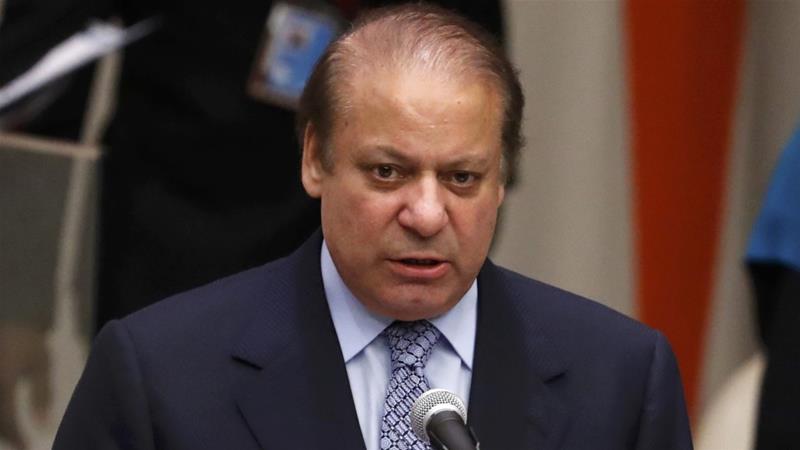How ‘Fontgate’ Could Bring Down Pakistan’s Premier

EghtesadOnline: A corruption case against Pakistan’s first family has tipped the country into political turmoil ahead of elections next year. The Supreme Court is due to start a hearing on Monday into graft allegations leveled against Prime Minister Nawaz Sharif and his children.
Sharif, who denies the charges, risks being ousted from power for a third time in what will be the culmination of the first investigation by a civilian court into a sitting Pakistani leader. It’s the latest chapter of strife in Pakistan’s turbulent political history, according to Bloomberg.
1. What allegations have been leveled at the first family?
A report last year by the International Consortium of Investigative Journalists, based on leaked documents from Panama-based law firm Mossack Fonseca, showed Sharif’s three children either owned or had signing rights to authorize transactions by offshore companies in the British Virgin Islands. Those holdings were allegedly used to make high-end property purchases in London. The family’s political opponents, led by former cricket star Imran Khan, have said the properties were obtained through corrupt proceeds. Khan took the case to the nation’s top court and in April, two of the five members of the Supreme Court recommended Nawaz Sharif be disqualified, while the other three mandated a further probe into the family.
2. What did the probe recommend?
The investigative team released its report to the court on July 10. It recommended the court take up a case against the family over the significant gap between the “declared sources of income and the wealth accumulated,” as well as over the presentation of documents to the inquiry that appear to be forged -- dubbed ‘fontgate’. The prime minister’s daughter, Maryam Sharif, provided a letter dated 2006 that she said showed she transferred property deeds to her brother. It was written in Calibri font, which the investigation team noted wasn’t released commercially until 2007.
3. Will the Supreme Court disqualify the prime minister?
It’s too early to say. The court will begin verification of the documents provided by the investigative team on Monday, and Sharif’s legal team is set to challenge the findings. “It’s not going to end so quickly,” with Sharif likely to appeal against any rulings, according to former Justice Tariq Mahmood. The Supreme Court may also assign the National Accountability Bureau to look into the report, which political and legal experts say will slow down the process.
4. Will Sharif resign?
That’s what Pakistan’s major opposition parties have called for. When the so-called Panama Papers were leaked last year, the prime minister said he would step down if the charges were proved. Since then his family has dug in. Daughter Maryam, who is seen as a potential succession leader of the ruling Pakistan Muslim League-Nawaz party, has disputed the allegations and said her father won’t resign. “I have no burden on my conscience,” the prime minister said at a cabinet meeting on July 13. “Our family has gained nothing from the politics, rather it has lost a lot.”
5. What happens if Sharif is ousted?
Either a lawmaker from his party would take the helm, or the PML-N would call early elections and dissolve Parliament. So far it’s not clear who would step up to take his position in the party, and PML-N officials haven’t publicly indicated a clear successor. Speculation rests on candidates such as the prime minister’s brother and chief minister of Punjab province, Shehbaz Sharif, or Shehbaz’s son Hamza. Other potential names include Interior Minister Chaudhry Nisar Ali Khan and Planning and Reforms Minister Ahsan Iqbal.
6. What about Pakistan’s powerful military?
Two of the six members of the court-mandated investigative team came from military bodies, including the feared Inter-Services Intelligence agency. That’s raised eyebrows over the involvement of the armed forces in a civilian legal matter. There is great mistrust between the Sharifs and the military establishment; Nawaz Sharif was ousted in a previous stint in power by a coup led by General Pervez Musharraf in 1999. The armed forces have ruled Pakistan for much of its 70 years and have entrenched positions in the economy through land ownership and share holdings in large corporations, along with an oversized sway on foreign policy. Of the case, Pakistan’s military spokesman Major General Asif Ghafoor said in a tweet on April 8: “The army, like every Pakistani awaits a decision based on justice and merit.”
7. Will the turmoil hit the economy?
It comes as the economy faces headwinds after years of above-5-percent growth on the back of Chinese infrastructure funding. The country’s key stock index had its biggest slump in more than eight years on July 11, a day after the investigation recommended legal proceedings against Sharif. Though a ruling against Sharif may prompt more selling -- on top of a widening current account deficit and a recent currency wobble -- there’s reason to believe the chaos may not hinder economic growth in the longer term. China is financing more than $50 billion in infrastructure projects across the country, and Pakistan’s military is heavily invested in the country’s economic stability.
The Reference Shelf
- Pakistan’s government has been rattled by the corruption probe.
- A QuickTake explainer on Pakistan’s continual turmoil.
- Sharif’s first reaction to the Panama Papers: nothing to see here.
- A 2013 profile of Sharif.


